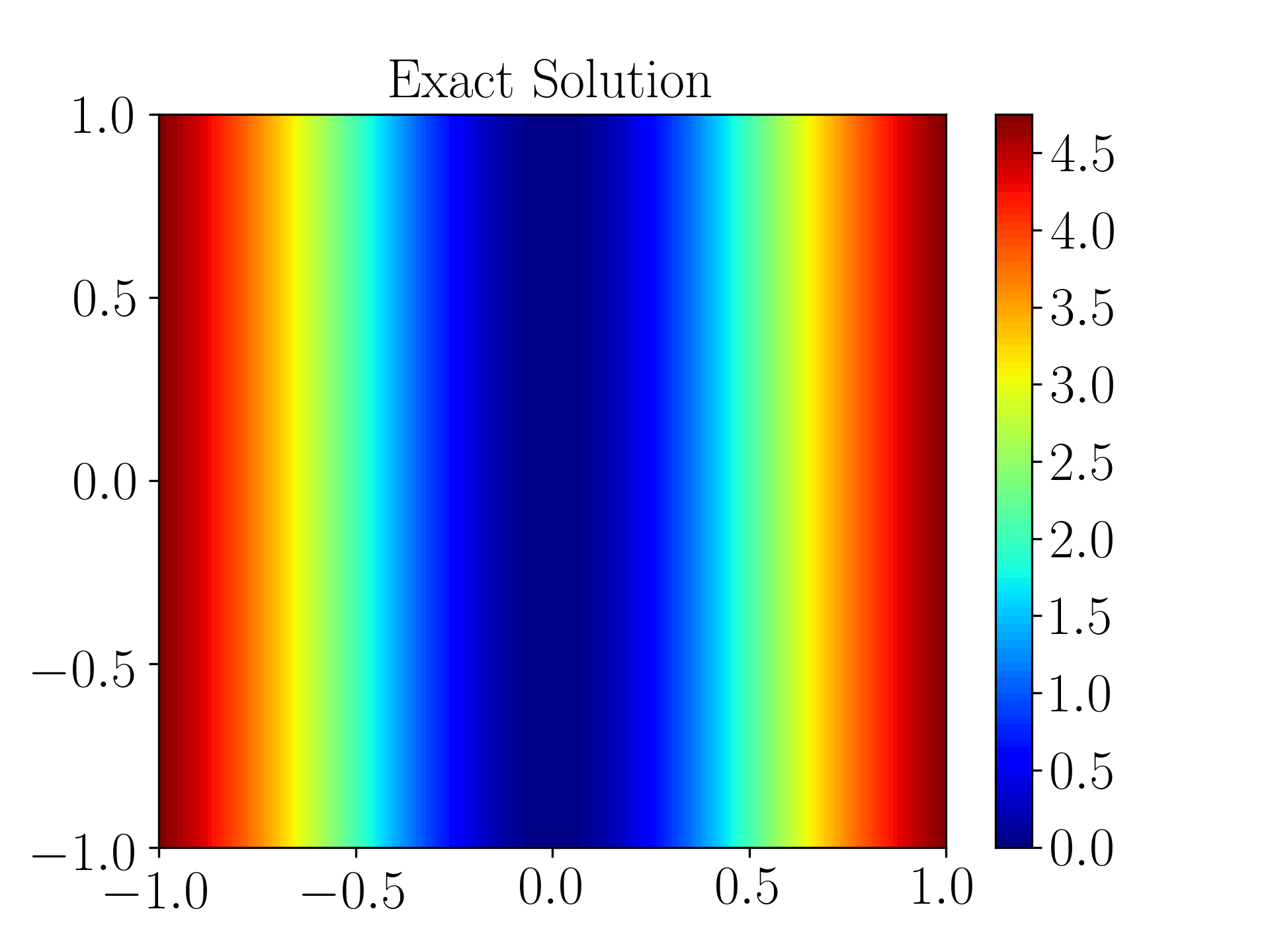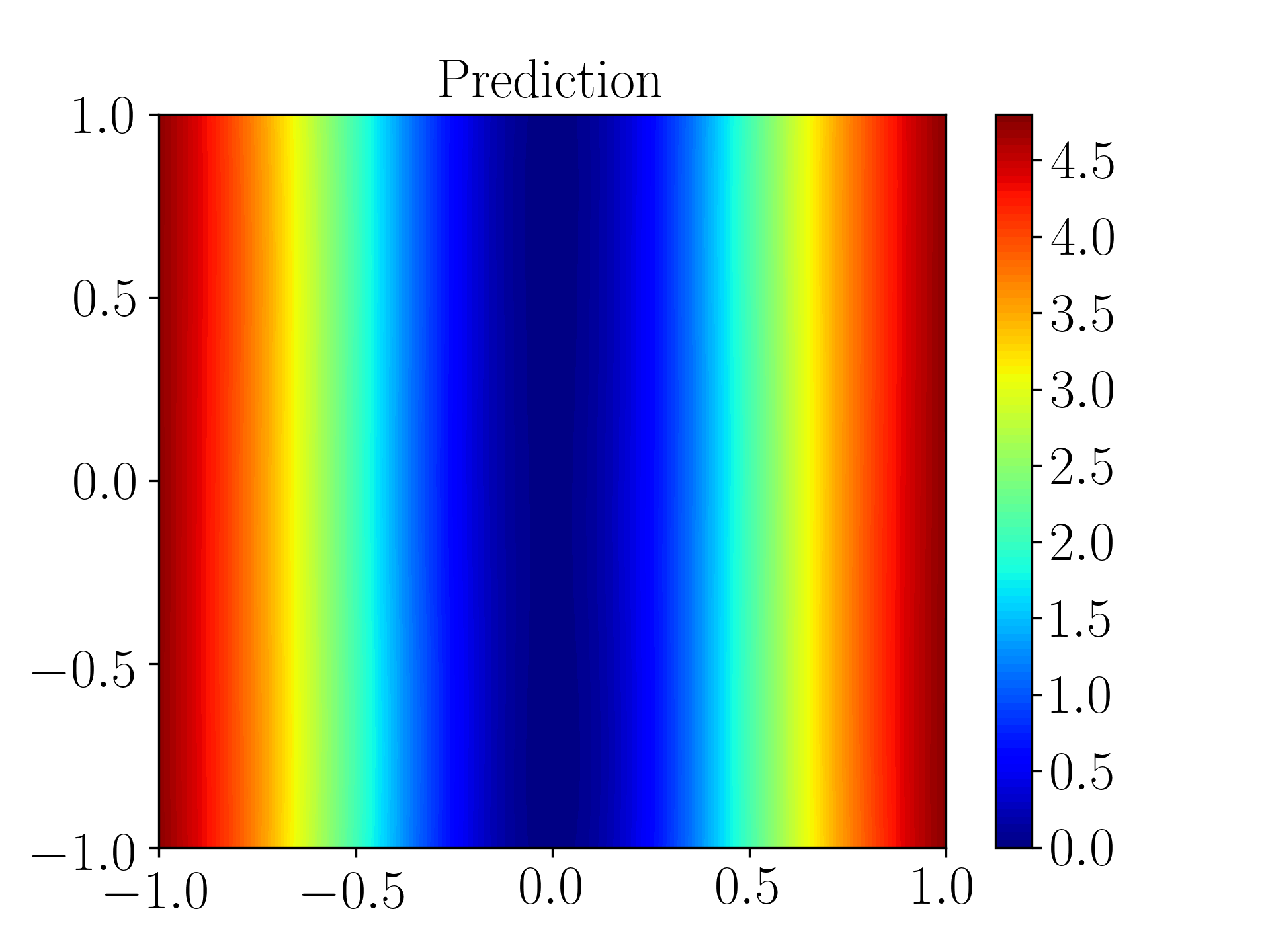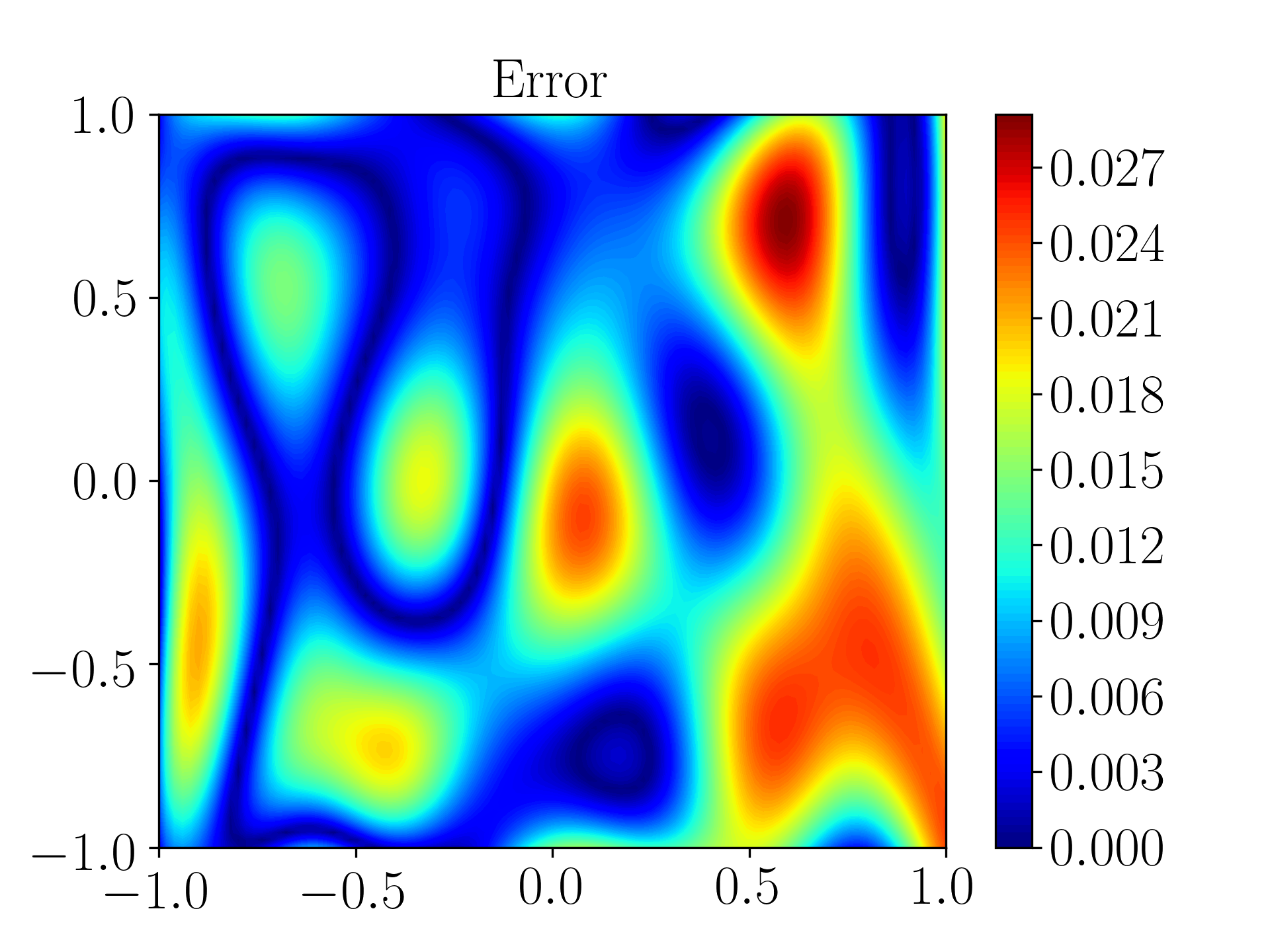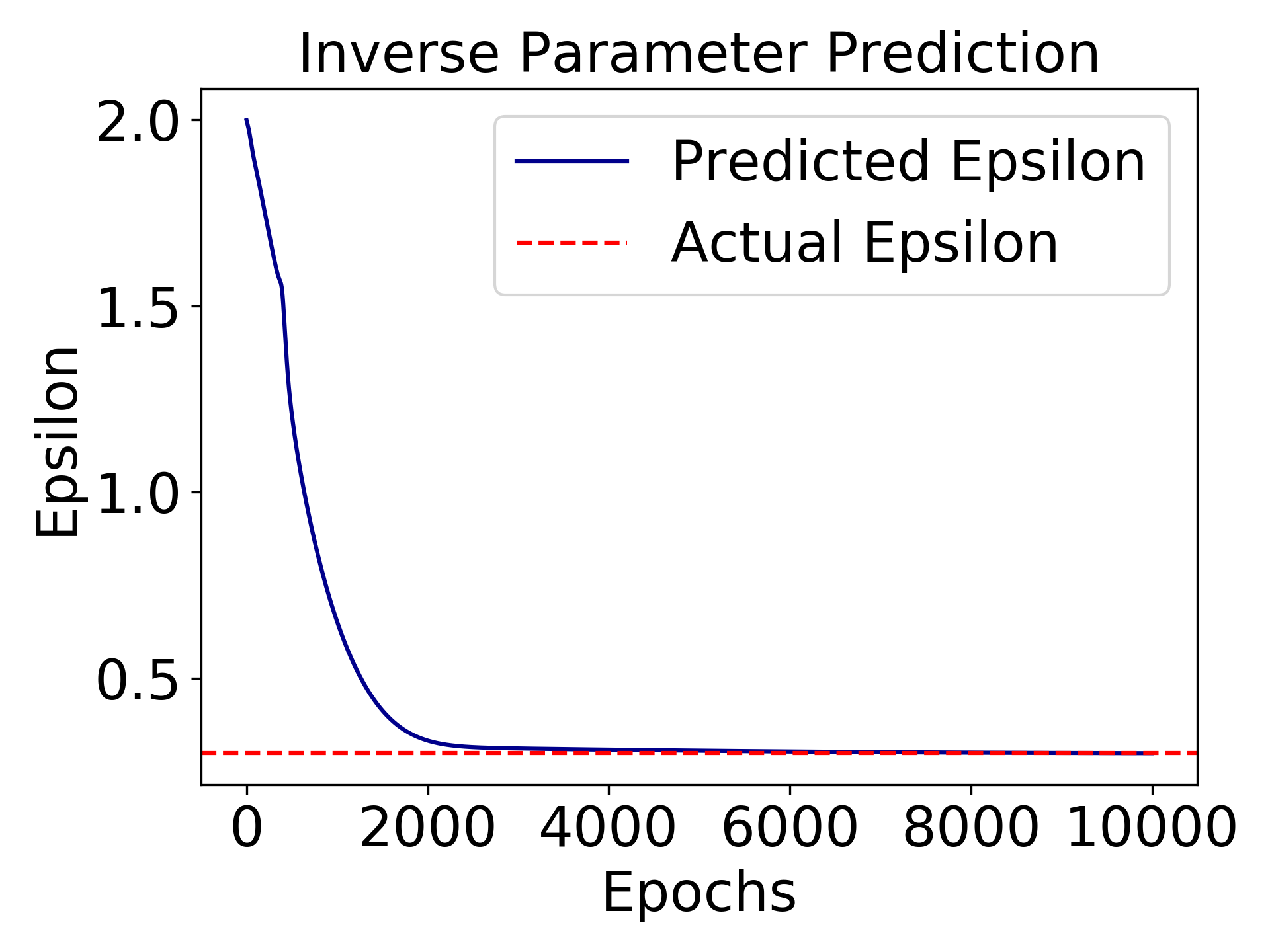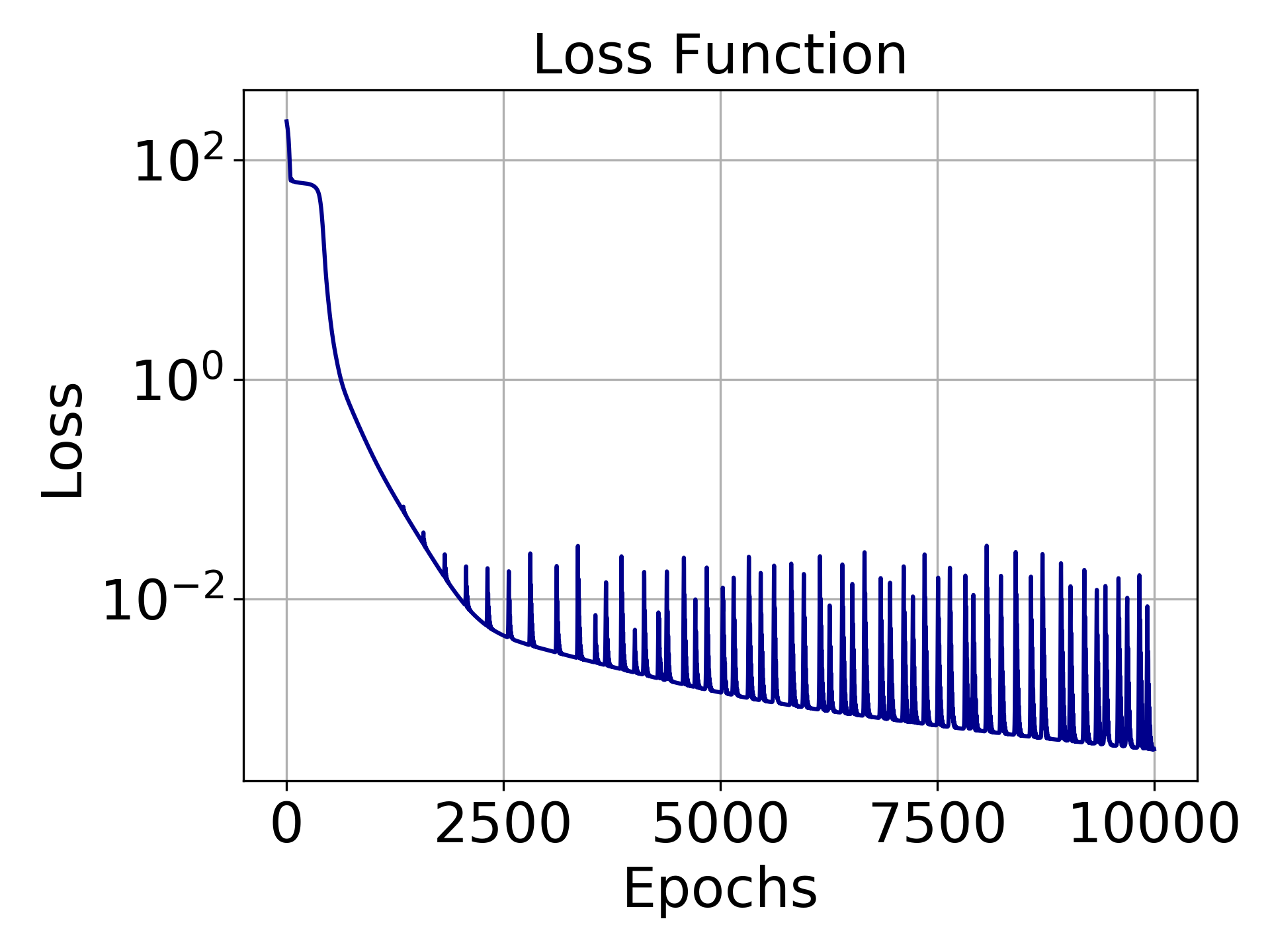Solving Inverse Problems with FastVPINNs : Estimation of uniform diffusion parameter on a quadrilateral geometry.
In this example, we will learn how to solve inverse problems using FastVPINNs. In particular, we will solve the 2-dimensional Poisson equation, as shown below, while simultaneously estimating the uniform diffusion parameter \(\varepsilon\) using synthetically generated sensor data.
for the actual solution \(u(x, y) = 10 \sin(x) \tanh(x) e^{-\varepsilon x^2}\) In this problem, the actual value of the diffusion parameter, \(\epsilon_{\text{actual}}\) is 0.3, and we start with an initial guess of \(\epsilon_{\text{initial}}=2.0\).
We begin by introducing the various files required to run this example
Contents
Steps to run the code
To run the code, execute the following command:
python3 main_inverse.py input_inverse.yaml
Example File
The example file, inverse_uniform.py, defines the boundary
conditions and boundary values, the forcing function and exact function
(if test error needs to be calculated), bilinear parameters and the
actual value of the parameter that needs to be estimated (if the error
between the actual and estimated parameter needs to be calculated)
Defining the boundary values
The current version of FastVPINNs only implements Dirichlet boundary conditions. The boundary values can be set by defining a function for each boundary,
EPS = 0.3
def left_boundary(x, y):
"""
This function will return the boundary value for given component of a boundary
"""
val = np.sin(x) * np.tanh(x) * np.exp(-1.0 * EPS * (x**2)) * 10
return val
Here EPS is the actual value of the diffusion parameter to be
estimated. In the above snippet, we define a function left_boundary
which returns the Dirichlet values to be enforced at that boundary.
Similarly, we can define more boundary functions like
right_boundary, top_boundary and bottom_boundary. Once these
functions are defined, we can assign them to the respective boundaries
using get_boundary_function_dict
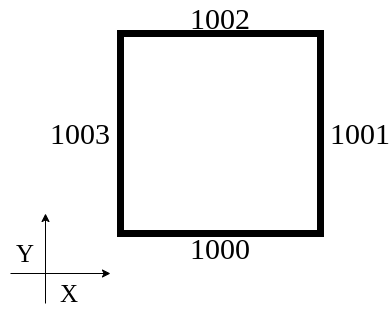
def get_boundary_function_dict():
"""
This function will return a dictionary of boundary functions
"""
return {1000: bottom_boundary, 1001: right_boundary, 1002: top_boundary, 1003: left_boundary}
Here, 1000, 1001, etc. are the boundary identifiers obtained
from the geometry. Thus, each boundary gets mapped to it boundary value
in the dictionary.
Defining the boundary conditions
As explained above, each boundary has an identifier. The function
get_bound_cond_dict maps the boundary identifier to the boundary
condition (only Dirichlet boundary condition is implemented at this
point).
def get_bound_cond_dict():
"""
This function will return a dictionary of boundary conditions
"""
return {1000: "dirichlet", 1001: "dirichlet", 1002: "dirichlet", 1003: "dirichlet"}
Defining the forcing function
The rhs function can be used to define the forcing function \(f\).
def rhs(x, y):
"""
This function will return the value of the rhs at a given point
"""
X = x
Y = y
eps = EPS
return (
-EPS
* (
40.0 * X * eps * (np.tanh(X) ** 2 - 1) * np.sin(X)
- 40.0 * X * eps * np.cos(X) * np.tanh(X)
+ 10 * eps * (4.0 * X**2 * eps - 2.0) * np.sin(X) * np.tanh(X)
+ 20 * (np.tanh(X) ** 2 - 1) * np.sin(X) * np.tanh(X)
- 20 * (np.tanh(X) ** 2 - 1) * np.cos(X)
- 10 * np.sin(X) * np.tanh(X)
)
* np.exp(-1.0 * X**2 * eps)
)
Defining the bilinear parameters
The bilinear parameters like diffusion constant and convective velocity
can be defined by get_bilinear_params_dict
def get_bilinear_params_dict():
"""
This function will return a dictionary of bilinear parameters
"""
# Initial Guess
eps = EPS
return {"eps": eps}
Here, eps denoted the diffusion constant.
Defining the target parameter values for testing
To test if our solver converges to the correct value of the parameter to
be estimated, we use the function get_inverse_params_actual_dict.
def get_inverse_params_actual_dict():
"""
This function will return a dictionary of inverse parameters
"""
# Initial Guess
eps = EPS
return {"eps": eps}
This can then be used to calculate some error metric that assesses the performance of our solver.
Input file
The input file, input_inverse.yaml, is used to define inputs to your
solver. These will usually parameters that will changed often throughout
your experimentation, hence it is best practice to pass these parameters
externally. The input file is divided based on the modules.
Experimentation parameters
Defines the output path where the results will be saved.
experimentation:
output_path: "output/inv_test" # Path to the output directory where the results will be saved.
Geometry parameters
In this example, we set the
mesh_generation_methodas"internal". This generates a regular quadrilateral domain with a uniform mesh.The parameters in
internal_mesh_paramsdefine the x and y limits of the quadrilateral domain(xmin,xmax,yminandymax), number of cells in the domain in the x and y direction (n_cells_xandn_cells_y), number of total boundary points (n_boundary_points) and number of test points in x and y direction (n_test_points_xandn_test_points_y).mesh_typeis set to “quadrilateral” which means that the mesh is a quadrilateral mesh. Note: As of now, only quadrilateral meshes are supported. So,mesh_typeis set to quadrilateral.boundary_sampling_methodis set to “uniform” which means that the boundary points are sampled using the “uniform” method. (Use only uniform sampling as of now.)external_mesh_paramscan be used to specify parameters for the external mesh, and can be ignored for this example.
geometry:
mesh_generation_method: "internal"
internal_mesh_params:
x_min: -1
x_max: 1
y_min: -1
y_max: 1
n_cells_x: 2
n_cells_y: 2
n_boundary_points: 2000
n_test_points_x: 100
n_test_points_y: 100
mesh_type: "quadrilateral"
external_mesh_params:
mesh_file_name: "meshes/rect_quad.mesh" # should be a .mesh file
boundary_refinement_level: 8
boundary_sampling_method: "uniform" # "uniform"
Finite element space parameters
The parameters related to the finite element space are defined here.
- fe_order sets the order of the finite element test functions.
fe_typeset which type of polynomial will be used as the finite element test function.quad_orderis the number of quadrature in each direction in each cell. Thus the total number of quadrature points in each cell will bequad_order\(^2\)quad_typespecifies the quadrature rule to be used.
fe:
fe_order: 10
fe_type: "jacobi" #"parmoon", "legendre" and "legendre".
quad_order: 40
quad_type: "gauss-jacobi" # "gauss-jacobi, gauss-legendre, gauss-lobatto"
PDE beta parameters
The beta specifies the weight by which the boundary loss will be
multiplied before being added to the PDE loss.
pde:
beta: 10 # Parameter for the PDE.
Model parameters
The parameters pertaining to the neural network are specified here.
model_architectureis used to specify the dimensions of the neural network. In this example, [2, 30, 30, 30, 1] corresponds to a neural network with 2 inputs (for a 2-dimensional problem), 1 output (for a scalar problem) and 3 hidden layers with 30 neurons each.activationspecifies the activation function to be used.use_attentionspecifies if attention layers are to be used in the model. This feature is currently under development and hence should be set tofalsefor now.epochsis the number of iterations for which the network must be trained.dtypespecifies which datatype (float32orfloat64) will be used for the tensor calculations.set_memory_growth, when set toTruewill enable tensorflow’s memory growth function, restricting the memory usage on the GPU. This is currently under development and must be set toFalsefor now.learning_ratesets the learning rateinitial_learning_rateif a constant learning rate is used.A learning rate scheduler can be used by toggling
use_lr_schedulerto True and setting the corresponding decay parameters below it. Thedecay_stepsparameter is the number of steps between each learning rate decay. Thedecay_rateparameter is the decay rate for the learning rate. Thestaircaseparameter is a flag indicating whether to use the staircase decay.
model:
model_architecture: [2, 30,30,30, 1]
activation: "tanh"
use_attention: False
epochs: 10000
dtype: "float32"
set_memory_growth: False
learning_rate:
initial_learning_rate: 0.001
use_lr_scheduler: False
decay_steps: 1000
decay_rate: 0.9
staircase: False
Logging parameters
It specifies the frequency with which the progress bar and console output will be updated, and at what interval will inference be carried out to print the solution image in the output folder.
logging:
update_console_output: 5000 # Number of steps between each update of the console output.
Inverse
Specific inputs only for inverse problems. num_sensor_points
specifies the number of points in the domain at which the solution is
known (or “sensed”).
inverse:
num_sensor_points: 50
Main file
This is the main file which needs to be run for the experiment, with the
input file as an argument. For the example, we will use the main file
main_inverse.py
Following are the key components of a FastVPINNs main file
Import relevant FastVPINNs methods
from fastvpinns.data.datahandler2d import DataHandler2D
from fastvpinns.FE.fespace2d import Fespace2D
from fastvpinns.Geometry.geometry_2d import Geometry_2D
Will import the functions related to setting up the finite element space, 2D Geometry and the datahandler required to manage data and make it available to the model.
from fastvpinns.model.model_inverse import DenseModel_Inverse
Will import the model file where the neural network and its training
function is defined. The model file model_inverse.py contains the
DenseModel_Inverse class specifically designed for inverse problems
where a spatially varying parameter has to be estimated along with the
solution.
from fastvpinns.physics.poisson2d_inverse import *
Will import the loss function specifically designed for this problem, with a sensor loss added to the PDE and boundary losses.
from fastvpinns.utils.compute_utils import compute_errors_combined
from fastvpinns.utils.plot_utils import plot_contour, plot_loss_function, plot_test_loss_function
from fastvpinns.utils.print_utils import print_table
Will import functions to calculate the loss, plot the results and print outputs to the console.
Reading the Input File
The input file is loaded into config and the input parameters are
read and assigned to their respective variables.
Setting up the Geometry2D object
domain = Geometry_2D(i_mesh_type, i_mesh_generation_method, i_n_test_points_x, i_n_test_points_y, i_output_path)
will instantiate a Geometry_2D object, domain, with the mesh
type, mesh generation method and test points. In our example, the mesh
generation method is internal, so the cells and boundary points will
be obtained using the generate_quad_mesh_internal method.
cells, boundary_points = domain.generate_quad_mesh_internal(
x_limits=[i_x_min, i_x_max],
y_limits=[i_y_min, i_y_max],
n_cells_x=i_n_cells_x,
n_cells_y=i_n_cells_y,
num_boundary_points=i_n_boundary_points,
)
Reading the boundary conditions and values
As explained in the example file section, the boundary conditions and values are read as a dictionary from the example file
bound_function_dict, bound_condition_dict = get_boundary_function_dict(), get_bound_cond_dict()
Setting up the finite element space
fespace = Fespace2D(
mesh=domain.mesh,
cells=cells,
boundary_points=boundary_points,
cell_type=domain.mesh_type,
fe_order=i_fe_order,
fe_type=i_fe_type,
quad_order=i_quad_order,
quad_type=i_quad_type,
fe_transformation_type="bilinear",
bound_function_dict=bound_function_dict,
bound_condition_dict=bound_condition_dict,
forcing_function=rhs,
output_path=i_output_path,
)
fespace will contain all the information about the finite element
space, including those read from the input file
Instantiating the inverse model
model = DenseModel_Inverse(
layer_dims=i_model_architecture,
learning_rate_dict=i_learning_rate_dict,
params_dict=params_dict,
loss_function=pde_loss_poisson_inverse,
input_tensors_list=[datahandler.x_pde_list, train_dirichlet_input, train_dirichlet_output],
orig_factor_matrices=[
datahandler.shape_val_mat_list,
datahandler.grad_x_mat_list,
datahandler.grad_y_mat_list,
],
force_function_list=datahandler.forcing_function_list,
sensor_list=[points, sensor_values],
inverse_params_dict=inverse_params_dict,
tensor_dtype=i_dtype,
use_attention=i_use_attention,
activation=i_activation,
hessian=False,
)
DenseModel_Inverse is a model written for inverse problems with
spatially varying parameter estimation. In this problem, we pass the
loss function pde_loss_poisson_inverse from the physics file
poisson_inverse.py.
Training the model
We are now ready to train the model to approximate the solution of the PDE while estimating the unknown diffusion parameter using the sensor data.
for epoch in range(num_epochs):
# Train the model
batch_start_time = time.time()
loss = model.train_step(beta=beta, bilinear_params_dict=bilinear_params_dict)
...
